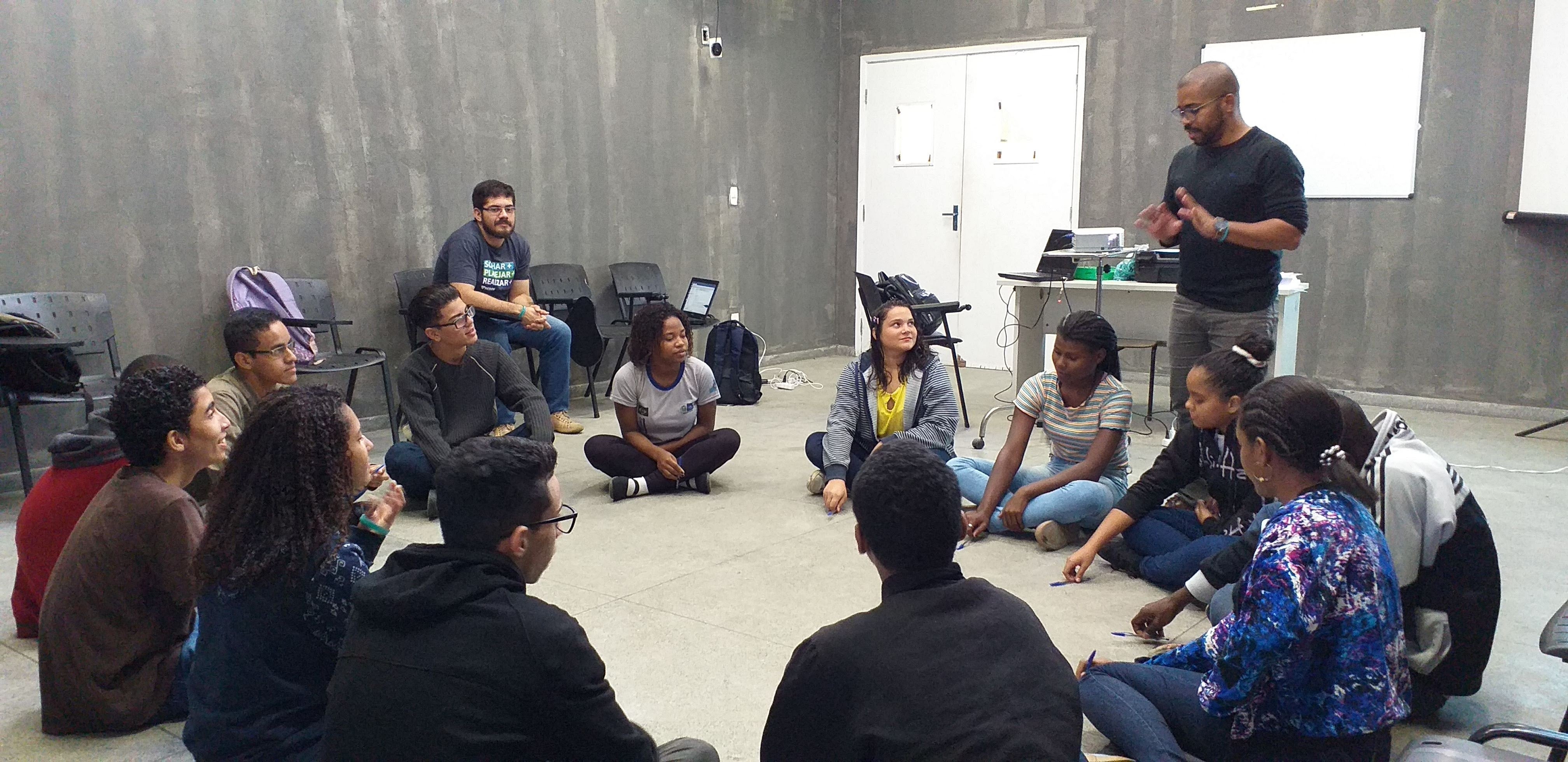 Programe o seu Futuro
Programe o seu Futuro
“A brand-new car, a real job, vacations every year…”
This, our cab driver told us, is what youth growing up in Rio de Janeiro’s notorious favelas aspire to. We were on our way to Pavuna, a district in the city’s north. Pavuna is just 20 miles from the dazzling beaches of Copacabana but, for the people that live there, they are worlds apart. Our driver, who picked us up on one of those beaches, was unnerved by our destination: “You know, it’s really dangerous there.”
You may have seen media coverage or watched a film (like the Oscar-nominated City of God, or Cidade de Deus) about how difficult life is for youth living in Rio de Jainero’s favelas. The statistics are staggering. In Brazil, and Rio de Janeiro in particular, youth homicide rates are several times higher than those in countries at war. Stories of violence abound, of doctors likening the injuries they tend to, to those from a warzone, of students unable to make it to college entrance exams because they are trapped inside by a gunfight. Photographer Joao Pina’s book documenting life inside the favelas is titled 46,750, the number of murders in Rio de Janeiro in the decade from 2007 to 2016. Pavuna, today, is Rio de Janeiro’s most violent area.
For youth growing up under these conditions, realizing that aspiration of a brand-new car, a real job, and vacations every year is difficult, to say the least. Limited access to quality education, lack of accessible technical and vocational training in skills that are valued by employers in high growth sectors, and discrimination by those same employers have contributed to high rates of youth unemployment (nearly 30% in Brazil as a whole). In contexts where gangs rule and outside options are limited or simply not there, youth are at a high risk of associating with such criminal groups. Indeed, they may have no other choice.
The situation is arguably even more frustrating as Brazil is currently facing massive labor shortages in important growth sectors. Forbes reports that Brazil needs 48,000 professionals in the technology sector alone, which could result in losses of up to US $28 billion by 2020 if not met. There is an inherent contradiction between Brazil’s enormous labor shortages and the lack of job opportunities for young Brazilians.
There are many in Brazil that recognize this contradiction but also the opportunity it provides, and several organizations are working to prepare at-risk populations for careers in tech. Banco Maré, a fintech startup in the Maré favela near Pavuna, has developed a basic programming curriculum for youth with limited educational background which includes HTML and Python. Carambola in São Paulo prepares youth for careers as programmers by coaching them through projects for real clients who are then offered the chance to hire youth, so long as they employ the full team. This includes three individuals, at least two of whom must be from a marginalized population (women, afro-descendants, LGBT persons, etc.). Some of the youth entering the program have barely seen a computer. A career in tech is not an option for all, however, and organizations such as the Centro de Integração Empresa-Escola (CIEE) broker much-coveted spots in Brazil’s formal apprenticeship system, Jovem Aprendiz. They work with selected youth to prepare them for success in the workplace, and run a program, Jovem Alerta, which targets socioeconomically disadvantaged youth to increase their charges of securing an apprenticeship.
There is no shortage of good ideas, but there is a lack of hard evidence on which to build a replicable, scalable model. This is where the World Bank’s Development Impact Evaluation (DIME) team comes in. In partnership with the Vila Olimpica Clara Nunes, a community sports center at the heart of Pavuna, we have launched “Program Your Future” (Programe o seu Futuro) to test whether these ideas can yield results for promising youth aged 14-24 growing up in high-violence and otherwise challenging settings. Through a randomized controlled trial, we are testing two approaches to preparing youth for the formal labor market. The first includes CIEE’s Jovem Alerta program combined with financial literacy training by SICOOB, the association of Brazilian credit cooperatives. The second includes a programming curriculum developed by computer science faculty at the Federal University of Rio de Janeiro complemented by advanced training in blockchain technology by the Blockchain Academy.
We are testing whether these low-cost, easily replicable and scalable interventions can be successful in improving jobs-related and social outcomes for participating youth. If so, there is great potential for scale-up in Rio de Janeiro and in other parts of Brazil, especially as the Brazilian government is currently planning a major effort to modernize technical and vocational training and align this with private sector needs. We’ve already received quite a bit of attention in the Brazilian press (here, here, and here, for example).
Programe o seu Futuro is a labor of love but, in this case, love is not all we need. All partners are contributing what they can. Vila Olimpica is contributing space for the program and community outreach. Banco Maré, SICOOB, and the Blockchain Academy are contributing their curricula and expertise. SICOOB is, additionally, donating forty computers for a lab at Vila Olimpica which will serve the community for years to come. Brazil’s Securities and Exchange Commission, Comissao de Valores Mobiliarios (CVM) is providing local convening power and leading ongoing efforts to mobilize private sector partners to fund program scale-up and further testing (conditional on successful results from our initial RCT) and to create linkages with firms that may be interested in hiring Programe o Seu Futuro participants, since these youth are not part of the population that would not normally be considered by such firms (see their official press release). The World Bank is leading on the research side and contributing funds for the RCT, coordinating the broader effort, and linking the work to national policy.
Here's what some of our participants have to say so far:
Thamires, 19-years old, participating in Jovem Alerta: “The most interesting thing was learning about the details related to the labor market. we learned about how to take part in selection processes, how to deal with the work environment, how to dress for work, etc...I’ve already tried to start other courses and activities here, [but] this region does not have many options. This was the opportunity I found, and that’s why I chased it and came to class today.”
Rawide, 18 years old, participating in the programming course: “I think the class was very interesting...Now I know what programming means. I think about going to college. Maybe a Bachelor in Physical Education. But if I learn enough in this course, I now think I could also go on as a programmer... I’ve never seen courses like this being offered here. This is the first time!”



Join the Conversation